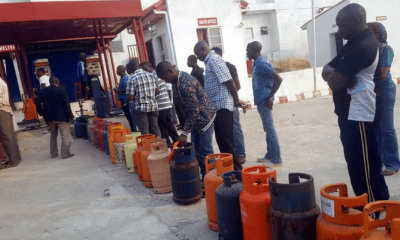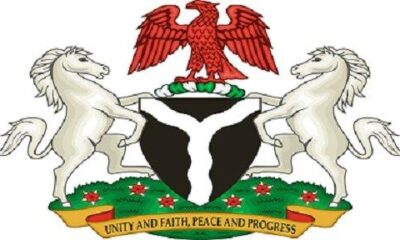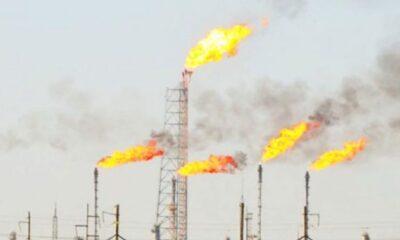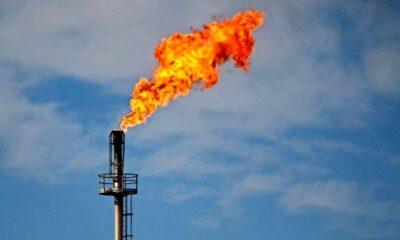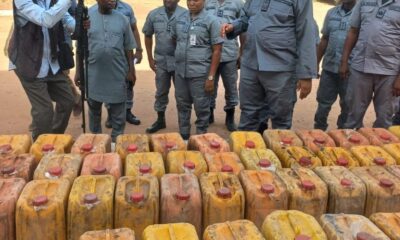Business
Nigeria Requires $20bn Annually For Gas Expansion Projects – NEITI
Published
9 months agoon
By
Editor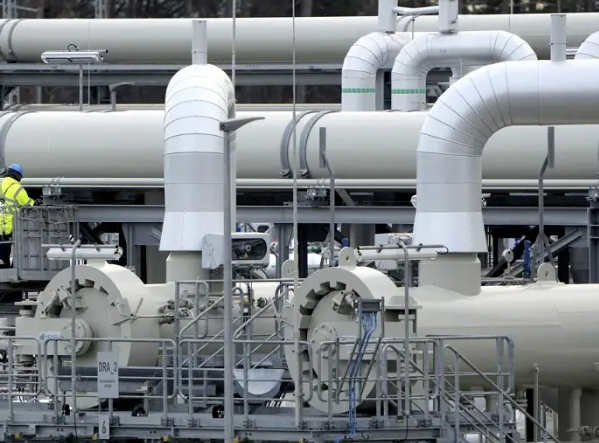
The Nigeria Extractive Industries Transparency Initiative (NEITI) says Nigeria requires $20 billion annually to achieve the desired gas expansion plan to bridge the country’s gas infrastructure.
Dr Orji Ogbonnaya Orji, NEITI Executive Secretary, at the policy dialogue on Nigeria’s Decade of Gas Action plan on Monday in Abuja said given the shrinking fossil fuel investment landscape, clarity was required of infrastructure to be prioritised.
The dialogue was organised by the African Initiative for Transparency, Accountability and Responsible Leadership (AFRITAL) in collaboration with the Natural Resource Governance Institute (NRGI).
The Federal Government in December 2020 rolled out the National Gas Expansion Programme (NGEP) to deepen the use of natural gas and make it a preferred form of cleaner, cheaper energy for both personal and industrial use.
In a remark, Orji said Nigeria had the largest gas reserves in Africa and the ninth-largest globally with gas reserves of over 200 trillion cubic feet (tcf).
READ ALSO: Job Racketeering: Reps Query JAMB Registrar, Oloyede Over Controversial Employment
“The Petroleum Industry Act (PIA) provides the most significant progress for the gas sector in strengthening governance and providing fiscal frameworks for the sector’s growth.
“The gas utilisation plan should show the market-driven opportunities that would successfully translate the gas plans into sustainable economic development.
“For the gas utilisation policy to work, there is a compelling need for deliberate ambitious investment in its infrastructure. This includes specific connectivity across upstream facilities to processing, power plants and other end uses.
“The network code provides a framework through third-party access to resolve some of the connectivity issues but to a large extent, achieving the desired gas expansion will require an estimated $20 billion annually,” he said.
Orji said that a new concept analysis would be required to demonstrate the new approaches the government intends to embrace to deliver on the gas infrastructure.
He recommended that the Federal Government should develop and publish a detailed, realistic, coated and comprehensive gas policy with clear roles for the state, and non-state actors and timelines to track periodic progress.
READ ALSO: Two Men stabbed In Homophobic Attack Outside London Night Club
Orji urged government to develop an industry-specific linkage between the integrated gas policy with Nigeria’s energy transition policies with a supporting action plan built on a robust monitoring and evaluation framework to track implementation.
He also called for a detailed plan to end gas flaring through a private sector-led commercialisation programme and pursue an open, competitive and transparent gas flare commercialisation programme,” he said.
Earlier, Dr Louis Ogbeifun, the Executive Director AFRITAL, had decried the fact that Nigeria is so rich in gas, but most of its citizens use firewood or coal for cooking with all its attendant health hazards.
“Over the years, Nigeria has behaved like the prodigal son by exporting mineral resources to earn dollars for consumption without savings, reinvestment in revenue, and employment generation ventures.
“These analogies reflect the contradiction of being a rich but poor nation. Rich because Nigeria is vastly rich and blessed with abundant minerals and energy resources but so poor that most citizens lack access to affordable electricity and other essential social and welfare benefits,” Ogbeifun said.
He said in a bid to reverse the highlighted negative narrations, achieve energy accessibility, afordability, and sustainability as a country that the 2021-2030 government legislation tagged the “Decade of Gas Action Plan (DofG)” was enunciated.
READ ALSO: Varsity Bans Students From Wearing Face Caps, Mini Skirts, Others
According to him, If the government’s intentions are effectively implemented, Nigeria is expected to witness a vast gas Infrastructural development during the period.
He said part of the stepping stones toward achieving the goals of DofG was the construction of the 614km Ajaokuta-Kaduna-Kano gas pipeline to transport about two billion of natural gas per day.
“This and other initiatives are also aimed at deepening the usage of LPG and CNG in the country and ultimately expanding the Autogas policy, which would reduce dependency on petrol as our mainstay for transportation in the long run.
“Before the AKKP project, Nigeria conceptualised the Nigeria-Morroco Gas Pipeline, as an extension of the West Africn Gas Pipeline, which would run through some African countries with a possible linkage to European market.
“This project was conceptualised in 2016. Outside the NLNG project, the Nigeria-Morrocco Gas Pipeline project would meet the international focus even as the local expansion of the LPG and CNG are also being pursued.
“Let us hope that our leaders would cautiously navigate the rough edges of the coup in the Niger Republic to forestall the risks of sabotage of this project by international state and non-state actors,” he said.
Also speaking, Mr Aaron Sayne of NGRI, called for tackling of foreign exchange and policy issues, investment and access to finance on gas project while indigenous players should take place of the International Oil Companies.
Mrs Oluremi Komolafe, Director, Gas, Ministry of Petroleum Resource, said the ministry would remain was committed to energy transition.
Komolafe added that the NGEP was making way toward its realisation, while Compressed Natural Gas engines conversion was ongoing, noting that production would be spured to meet demand.
(NAN)
You may like


Hope As Govt Inaugurates MDGIF To Slash LPG, CNG Prices


JUST IN: FG Bans Cooking Gas Export To Crash Price


Gas Truck Explodes In Lagos


FG Mulls Measures To Reduce Gas Price, Availability


Gas Flaring: FG Shortlists 42 Firms For Commercialisation Programme


Nigeria Loses N264.427bn To Gas Flare In 10 Months
Business
Naira Slumps, Exchanges At Over N1,500 Against Dollar
Published
3 days agoon
May 13, 2024By
Editor
The naira continued its depreciation against the US dollar in the foreign exchange market.
Data from the parallel market section and FMDQ showed further depreciation against the dollar on Monday.
At the parallel market, a Bureau De Change operator in Wuse Zone 4, Mistila Dayyabu, told DAILY POST that the naira was sold as high as N1,517 per dollar on Monday before settling at N1,500 per dollar.
“On Monday morning, the dollar was sold at N1,517 per dollar. However, on hearing the information about the coming of the Economic and Financial Crimes Commission operatives, we started selling at N1,500 this evening, ” he said.
READ ALSO: Why Naira Is Falling – Economist, Rewane
The figure increased from the N1, 450 per dollar it traded at the weekend.
Similarly, at the official market, FMDQ data showed that they dipped to N1478.11 per dollar on Monday from N1466.31 last Friday.
This represents an N11.8 drop from the N1466.31 recorded last Friday.
Earlier, the Central Bank of Nigeria Governor, Olayemi Cardoso, said the apex bank’s Monetary Policy Committee will do everything to bring down soaring Nigeria’s inflation, which stood at 33.22 per cent in March 2024.
Business
CAC Opens Centre For Registration Of PoS Operators
Published
1 week agoon
May 9, 2024By
Editor
The Corporate Affairs Commission has inaugurated a centre for bulk registration of Point of Sale operators in its database.
The CAC Registrar-General, Hussaini Magaji, said this while inaugurating the centre stationed at its Federal Capital Territory Office in Abuja on Wednesday.
According to Magaji, the importance of registering the PoS operators in the commission’s database cannot be over emphasised.
He said the centre was well equipped with all the necessary facilities to operate 24 hours a day and ensure the commission’s achievement of its purpose.
READ ALSO: ICYMI: FG To Delist Naira From P2P Platforms
“What we did was accommodate the request from the Fintechs.
“We have allowed them to integrate with the Corporate Affairs Commission; they have developed their structure, and we gave them access.
“Once they supply the necessary details for registration on their platform, the certificate is generally generated and transmitted directly to their platform without them having to contact anyone.
“We have done this to ensure that everyone gets it easy without hitches, but if they choose to apply manually, we have a secretariat open for them to do so,” he stated.
READ ALSO: ICYMI: FG Gives Deadline To PoS Operators To Register With CAC
Recall that the Federal Government through the CAC on Tuesday issued a two-month registration deadline to Point of Sales companies, to register their agents, merchants, and individuals with the commission in line with legal requirements and the directives of the Central Bank of Nigeria.
Meanwhile, at the event, the registrar-general reiterated that the centre would be opened to all operators in the fintech industry who voluntarily submitted their agents and merchants for regularisation with the CAC.
Magaji said that the registration was in line with President Bola Tinubu’s desire to ensure financial inclusion for the youth and strengthen the fight against fraud, finance and other crimes in the country.
He further expressed his resolve to ensure compliance with the provisions of Section 863 (1) of the Companies and Allied Matters, CAMA 2020, and the CBN guidelines for Agent Banking, 2013.
READ ALSO: ICYMI: Five Things To Know About The New Cybersecurity Levy To Be Paid By Nigerians
On security, the CAC boss said that if a crime were committed using the PoS, the government would easily trace the perpetrators to the CAC data platform if such machines were registered.
“If an incident happens and they report it to CAC, if we do not have the operator’s details, we cannot respond, and that is the essence of this registration.
“The registration ensures that every detail of the person is provided, including NIN, passport photograph and all other useful documents.
“And it is an opportunity for more people to be captured into the formal sector,” he said.
The News Agency of Nigeria reports that the Special Adviser to the President on ICT Development and Innovation, Tokoni Peter attended the event.
The event was attended by Dr Salihu Dasuki, the Special Adviser to the President on ICT Policy Office, the PoS operators, and other stakeholders.
(NAN)
Business
FULL LIST: CBN Publishes List Of Licensed Deposit Money Banks
Published
1 week agoon
May 8, 2024By
Editor
The Central Bank of Nigeria has released a comprehensive list of licensed Deposit Money Banks operating within the country.
The list, which was made public on the CBN’s official website on Tuesday, provides insights into the banking landscape in Nigeria.
Banks with international authorisation include Access Bank Limited, Fidelity Bank Plc, First City Monument Bank Limited, First Bank Nigeria Limited, Guaranty Trust Bank Limited, United Bank of Africa Plc, and Zenith Bank Plc.
READ ALSO: BDC Operators Arrested As Naira Sells 1,416/$
Commercial banks with national authorisation include Citibank Nigeria Limited, Ecobank Nigeria Limited, Heritage Bank Plc, Globus Bank Limited, Keystone Bank Limited, Polaris Bank Limited, Stanbic IBTC Bank Limited, Standard Chartered Bank Limited, Sterling Bank Limited, Titan Trust Bank Limited, Union Bank of Nigeria Plc, Unity Bank Plc, Wema Bank Plc, Premium Trust Bank Limited and Optimus Bank Limited.
Commercial banks with regional licenses are Providus Bank Limited, Parallex Bank Limited, Suntrust Bank Nigeria Limited, and Signature Bank Limited.
Players in the non-interest banking sector with national authorisation include Jaiz Bank Plc, Taj Bank Limited, Lotus Bank Limited, and Alternative Bank Limited.
READ ALSO: [ICYMI]FULL LIST: 16 Banking Transactions Exempted From CBN’s New
In the merchant banking category, the apex banks listed, are Coronation Merchant Bank Limited, FBN Merchant Bank Limited, FSDH Merchant Bank Limited, Greenwich Merchant Bank Limited, Nova Merchant Bank Limited, and Rand Merchant Bank Limited.
The financial holding companies listed were Access Holdings Plc, FBN Holdings Plc, FCMB Group Plc, FSDH Holding Company Limited, Guaranty Trust Holding Company Plc, Stanbic IBTC Holdings Plc, and Sterling Financial Holdings Limited.
The Mauritius Commercial Bank Representative Office (Nigeria) Limited was listed as the sole representative office.

B-I-Z-A-R-R-E! Man Missing For 26 Years Found Alive In Neighbour’s House

Bauchi Commissioner Gifts 3 Students Cash For Prompt Resumption, Ability To Read

NDIC Obtains Order To Wind Down 96 Microfinance, Mortgage Banks
Trending

 Headline3 days ago
Headline3 days agoLady Arrested For Allegedly Harassing, Cyberstalking Crown Prince Of Benin Kingdom [VIDEO]

 News5 days ago
News5 days agoTobi Amusan Becomes World’s Fastest Woman With New Track Record

 News3 days ago
News3 days agoEdo Govt Takes Custody Of 4-year-old Girl Used For Adult Content

 Headline3 days ago
Headline3 days ago32-year-old Nigerian Doctor Killed In US, Father Mourns

 News4 days ago
News4 days agoBREAKING: Organised Labour Shut BEDC Head Office

 Entertainment2 days ago
Entertainment2 days agoVIDEO: Drama As Portable Jumps Gate To Evade Police Arrest

 News3 days ago
News3 days agoMan Arrested For Invading Plateau Bank With Bomb

 Metro5 days ago
Metro5 days agoCustoms Intercepts N10m Worth Petrol En Route Cameroon Illegally

 News3 days ago
News3 days agoSee Lagos Environment Commissioner’s Funny Reply To Resident’s Complaint About Neighbours Moaning Loudly At Night

 Headline3 days ago
Headline3 days ago‘You’re Guilty’ – Judge Roars, Jailed UK-based Nigerian Pastor, Wife 34 Years For Raping, Assaulting Members
